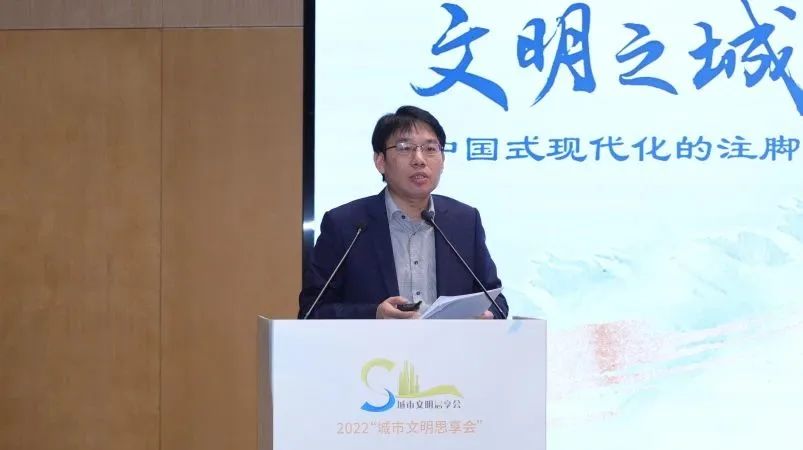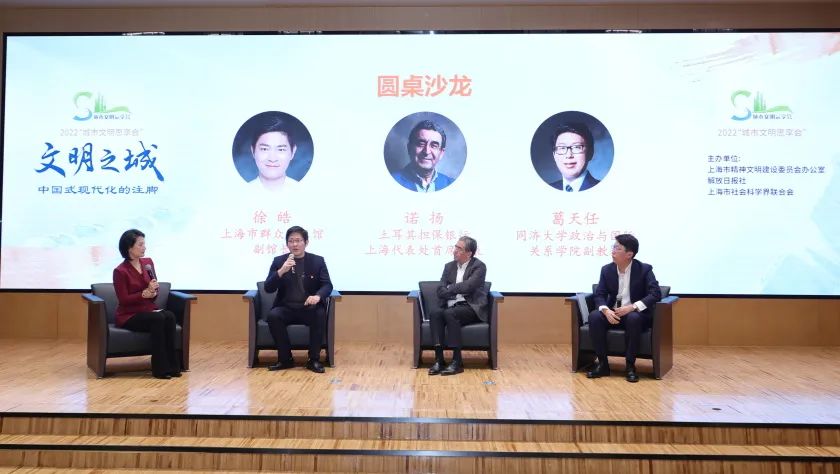The 2022 Urban Civilization Retreat showcases the bright future of Chinese modernization
On 8 December, the 2022 Urban Civilization Retreat was held under the theme of “Noble Shanghai as a Footnote to the Chinese Path to Modernization”.

“Shanghai’s urban development course, based on the integration and development of three major cultures, is actually a typical example of the Chinese path to modernization,” as keynote speaker Zheng Chongxuan observed. Zheng is a Deputy Director of the Institute of Literature of the Shanghai Academy of Social Sciences. In the speech titled “Integrated Development to Highlight the Charm of an International Metropolis,” he pointed out that culture is the soul of a city, a major indicator of its level of urban civilization and a source of power for its continuous development. Zheng suggested that it is necessary to further activate the source of literary and artistic originality, in order to create more inspiring cultural markers for Shanghai, to highlight different “personalities” of its different urban areas and to enhance the cultural functions of its urban spaces. Meanwhile, new cultural venues and scenes of various types should be created to endow the city with new cultural connotations. The narrative power of Shanghai should be enhanced, so that the city can tell the world moving and interesting stories of China and interpret the splendor of Shanghai in fascinating ways. By promoting the integrated development, symbiosis and common prosperity of the “three cultures” (including the red culture, the Shanghai-style culture and the Jiangnan culture), the charm of a modern international metropolis of socialism can be increasingly manifested as well.

The ethos of a city depends on its ideological and moral characters, in addition to the etiquette and civility of everyone in the city. At the round table discussion held during the event, Xu Hao, Deputy Director of Shanghai Mass Art Museum; Nuo Yang, chief representative of Turkey Garanti Bank Shanghai Representative Office; and Ge Tianren, Associate Professor of the School of Politics and International Relations of Tongji University School, shared their viewpoints on the theme.
Xu Hao noted that more cultural spaces have been provided for citizens in recent years. For example, as more and more citizens are beginning to appreciate grass-roots culture, such cultural activities are winning increasing numbers of people and in turn helping uplift the city. “Now we have a very popular program called ‘Civic Art Night School’. Since the needs of the elder and the young differ, we have differentiated time slots and venues, and offered programs according to the needs of different groups.”
In the speech, Xu elaborated on his own memories. “I remember that over two decades ago, I discussed with my friend at an intersection about whether the vehicles turning right should let the pedestrians crossing the street go first. Now in Shanghai, almost all right-turning vehicles automatically wait.” Nuo Yang said that in recent years, rude behaviors have been decreasing. He observed that people’s hope for better life means higher requirements on the cultural construction the city. Therefore, it is more important to continuously enhance the soft power of a city and cultivate the city’s more character.
Ge Tianren said that material civilization is the basis and premise, while spiritual civilization is the soul and direction of the city’s future development. They stand for two intertwined and indispensable aspects Chinese modern civilization, both of which interact with one another with the same goal for a prosperous city. In conclusion, he noted that these are the crucial elements of the city’s trajectory going forward. “In the future, Shanghai must develop in the integration and interaction of these two aspects in order to form and shape an outstanding world-class urban civilization”.

